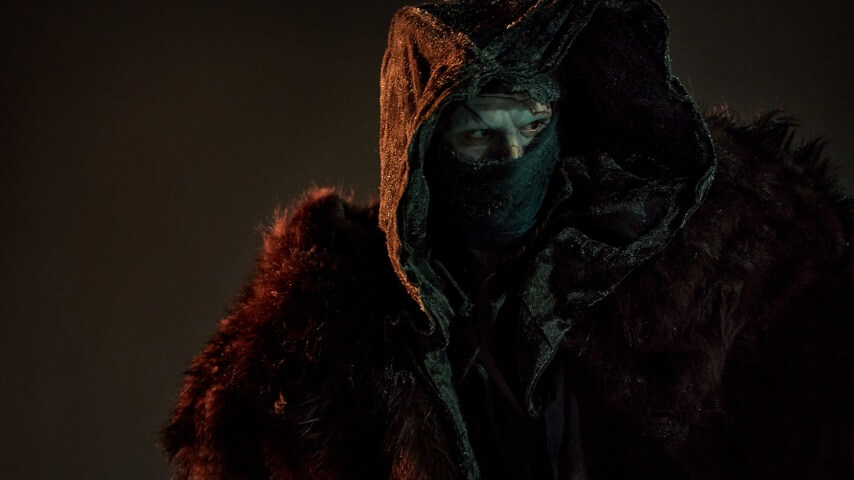The filmmaker is hardly the only one with this kind of relationship on his mind in 2025. The stress of raising a child, particularly amid social turmoil and personal burnout, is a theme that is especially visible in many of the year’s most acclaimed projects. In One Battle After Another, Bob (Leonardo DiCaprio) and Willa Ferguson (Chase Infiniti) are plucked from their quiet life after Bob’s revolutionary past catches up with them; he spends the rest of the runtime frantically trying to find his daughter as she defends herself from a different, much crueler father figure (Sean Penn’s Colonel Lockjaw). If I Had Legs I’d Kick You is even more claustrophobically focused on the parent’s point of view; Linda’s (Rose Byrne) unnamed daughter is merely a disembodied voice for almost the entirety of the film’s runtime. Her daughter is obviously ill, but we spend the most time empathizing with what the frame focuses on: her burnt-out, self-pitying mother. Die My Love likewise follows new mother Grace (Jennifer Lawrence) as she falls apart in her husband’s family’s country home, and also holds her child at a distance. In all of these films, especially when they focus on the mother, the parents are isolated from their pasts and/or their partners, leaving the audience, at least temporarily, stuck with them.
The central parent-child relationship in Frankenstein taps into a similar situation. After the birth of the Creature, Victor is likewise isolated in his castle, feebly trying to communicate with the new life he’s made and descending into madness, to the point that he tries to destroy his creation. A frustration towards and endangering of offspring is a theme shared across all these films, but Frankenstein uniquely lingers on the characters as children. It’s not just the Creature who gets a whole Bambi-esque act experiencing nature and the world through fresh eyes, but Victor too. Before we hear about his experiments, we see Victor’s own tough, borderline-abusive father (Charles Dance). In this adaptation, the elder Frankenstein is a physician who expects his son to study hard and uphold the family name when he heads to university; Victor’s youth is spent at their large estate seemingly away from most peers his own age and anyone who isn’t family or staff. In a film that is fairly loyal to its source material, this is one of the most significant changes from Mary Shelley’s novel. In Shelley’s work, Victor’s parents are professional but much more free-spirited. His father Alphonse is a public official, already retired by Victor’s childhood. While he still tries to steer his son, he’s not violent—unlike in the film, he doesn’t resort to corporal punishment when Victor forgets a fact about the human anatomy during a lesson.
This new version of Victor’s past helps us better understand his monstrous treatment of the Creature. A well-worn, pedantic observation is that the Creature is actually “Frankenstein’s monster,” and “Frankenstein” is the scientist who sired it; another is the note that the maker is, in fact, the real monster of Frankenstein. But del Toro is always going to attempt to understand his monster, and the excavation of Victor’s past is part of that effort. It’s time that’s not afforded to the year’s other difficult parental figures. But this knowledge does not make Victor less monstrous; it just makes it clear that, despite his scientific achievement, there are kinds of progress he is unable or unwilling to make. And by turning the Creature loose into the world—where he can learn on his own, but is hurt without a support system—Victor has created something capable of, even trained in, violence.
But he has also created something that is capable of forgiving him in the end. As with these other films, and with One Battle After Another in particular, the period of separation between parent and child is something that, at best, cannot last, and, at worst, is actively harmful to both of them. In OBAA, Bob is (rightfully) protective of Willa because he accurately assesses the danger his past poses to their future. Victor keeping his Creature in captivity is far less noble, but, like Willa, the Creature proves himself far more capable than his father believed him to be when he is plunged into a life-or-death situation. The Creature’s intelligence develops with nuance; he gains the ability to forgive the person who gave him life and hurt him so badly because he had time away from him.
Shelley’s Frankenstein is subtitled The Modern Prometheus. The implication is that her protagonist sinned in his quest, that his pursuit of knowledge ended in eternal punishment. But in del Toro’s film, it is not merely the Creation that is the sin, but what comes after. The irresponsibility, the parenting that doesn’t happen. The Creature, like any child, represents an open future that will be shaped by his experiences. Frankenstein doesn’t necessarily have the most positive view of parenting, even compared to some of this year’s other films about fallible parents, but it has an unabashedly optimistic view of creation—that our creations are good for the world, and that the world is good for them.

 Keep scrolling for more great stories.
Keep scrolling for more great stories.
